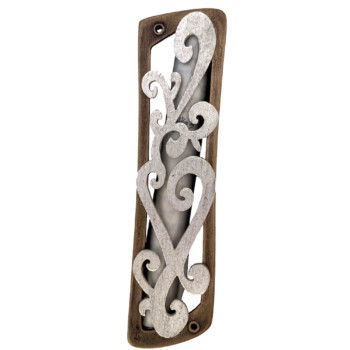Mezuzah
What is a Mezuzah?
The word mezuzah means doorpost. It is an ancient Jewish tradition to put sacred words (in the form of a very specific scroll) on our doorposts as a reminder that the home is a sanctuary – a sacred and safe haven. What is written on the scroll is the core teaching in Judaism paired down to one paragraph called the S’hma and V’ahavta, which are found in the Torah in Deuteronomy.
The first of the Jewish values, hand-written in Hebrew on the parchment scroll, is a call to listen and understand that we are all one. The writings then instruct us to love kindness, to treat all things with truth and compassion, to care for the earth and everything that dwells upon it, and to teach these values to our children and our children’s children.
According to the teaching, if we uphold these values, peace and justice will prevail and there will be protection for the soul. It is my wish to share the meaning of the mezuzah to “spread the love” with people regardless of religious affiliation and open the door to Judaism one mezuzah at a time.
How to Hang a Mezuzah
Attach the mezuzah case to the right-hand side of the doorpost. Hang it about 8″ from the top of the frame, at a 45 degree angle, with the top facing toward the inside of the house or room. Mezuzahs may be hung on inside and outside doors. Do not hang the mezuzah on bathrooms or closets.
Before attaching the mezuzah to the doorpost, say this blessing:
Baruch Ata Adonai, Eloheinu melech ha-olam, asher kidshanu b’mitzvotav v’tzivanu, likboa mezuzah.
Blessed art Thou, Lord our God, King of the universe who has sanctified us with His commandments and commanded us to affix a mezuzah.
Mezuzah Translation and Teaching
 Mezuzah Teachings
Mezuzah Teachings
The direct translation of the word mezuzah is “doorpost.” A mezuzah is the parchment on which the prayers Sh’ma and V’ahafta are written. I create the case which holds the parchment so that it may be attached to the front doorpost and every room of the home.
Mezuzah Translation
Sh’ma & V’ahafta translation
The first prayer (Sh’ma) translated in English means: Hear, O Israel: the Eternal One is our God, the Eternal God is one! Deuteronomy 6:4
The second prayer (V’ahavta) modern translation by Marcia Falk
Loving life and its mysterious source with all our heart and all our spirit, all our sense and strength, we take upon ourselves these promises: to care for the earth and those who live upon it, to pursue justice and peace, to love kindness and compassion. We will teach this to our children throughout the passage of the day as we dwell in our homes and as we go on our journeys, from the time we rise until the time we fall asleep. And may our actions be faithful to our words that our children’s children may live to know: Truth and kindness have embraced, peace and justice have kissed and are one. Deuteronomy 11:13
Traditional translation
-From “Like a Reed, The Message of the Mezuzah” (pp. 6) by Yehuda Cahn
Listen Israel, the Lord is our God, the Lord is one. You shall love the Lord your God with all your heart, with all your soul, and with all your strength. These words which I command you today shall be in your heart. You shall teach them to you children and speak about them when you sit at home, walk about, lie down, or get up. You whall tie them as a symbol on your arm and as a headpiece between your eyes. You shall write them on the doorways of your house and on your gates.
If you obey the percepts which I command you today to love the Lord your God and to serve him with all your heart and all your soul, then I will give rain to your land in its season, the fall and spring rains, and you will collect your grain, wine, and oil. I will give grass in your field for your cattle. You will eat and be satisfied. Guard yourselves, or your hearts will persuade you to turn from me and worship false things and bow to them. Then God’s anger will burn against you and He will stop up the skies so that there will be no rain. The land will yield no produce and you will perish from the good land which God gave you. You shall place these words in your heart and in your soul. You whall tie them as a symbol on your arm and as a headpiece between your eyes. You shall teach them to your children and speak about them when you sit at home, walk about, lie down, or get up. You whall tie them as a symbol on your arm and as a headpiece between your eyes. You shall write them on the doorways of your house and on your gates so that your days and the days of your children may be increased upon the land which G-d swore to give to your fathers for as long as the sky remains over the earth. Deuteronomy 11:13
Why is the letter Shin on the front of the Mezuzah?
Shin is the 21st Letter of the Hebrew Alphabet. On the Mezuzah case it represents “Shaddai,” which is one way of saying God in Hebrew. The root of the word Shaddai is Shad which means breast. It refers to the aspect of God, which is ‘The Nurturer.’ Shaddai is also thought to represent the protective aspect of G-d. Some rabbis believe that the word Shaddai is short for ‘Shomer Dalet Yisrael’ or protector of the gates of Israel.
Showing all 9 resultsSorted by latest
-
Price range: $100.00 through $179.00 Buy now This product has multiple variants. The options may be chosen on the product page









